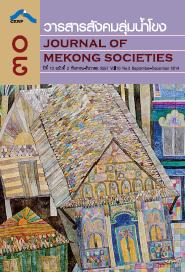Sino-North Korean Relations in the 1990s: Decline and Recovery
Main Article Content
Abstract
The article explores the enduring Sino-North Korean Alliance Treaty in the first decade of the post-Cold War era by using Stephen M. Walt’s ideas on factors leading to endurance and collapse of alliance. It argues that the enduring alliance between the two countries in the 1990s was the result of ideological solidarity, that is, the role of the American in East Asia and the Kosovo crisis in the late 1990s led to the recovery of relations between the two countries against US hegemony. However, Sino-North Korean relations warmed amid China’s changing security outlook from the Cold War mentality to the so-called “New Security Concept.” In other words, the original rationale of the Sino-North Korean alliance during the Cold War has evaporated.
Article Details
How to Cite
Kruarattikan, S. (2014). Sino-North Korean Relations in the 1990s: Decline and Recovery. Journal of Mekong Societies, 10(3), 193–217. retrieved from https://so03.tci-thaijo.org/index.php/mekongjournal/article/view/26772
Section
Articles


